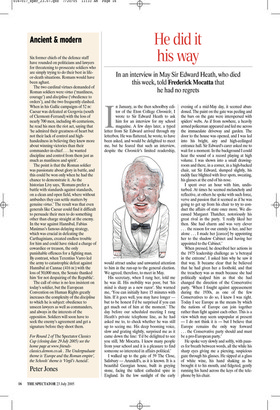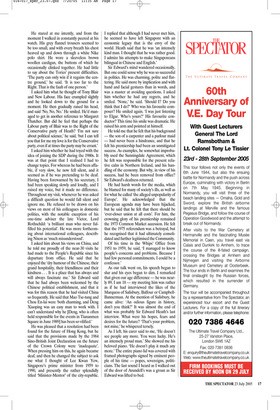He did it his way
In an interview in May Sir Edward Heath, who died this week, told Frederick Mocatta that he had no regrets In January, as the then schoolboy editor of the Eton College Chronicle, I wrote to Sir Edward Heath to ask him for an interview for my school magazine. A few days later, a typed letter from Sir Edward arrived through my letterbox. He was flattered, he wrote, to have been asked, and would be delighted to meet me, but he feared that such an interview, despite the Chronicle’s limited readership, would attract undue and unwanted attention to him in the run-up to the general election. We agreed, therefore, to meet in May.
His secretary, when I rang her, told me he was ill. His mobility was poor, but ‘his mind is sharp as a new razor’. She warned me, ‘You can initially have 15 minutes with him. If it goes well, you may have longer but to be honest I’d be surprised if you can get much out of him at the moment.’ The day before our scheduled meeting I rang Heath’s private telephone line, as he had asked me to, to check whether he was still up to seeing me. His deep booming voice, slow and grating slightly, surprised me as it came down the line: ‘I’d be delighted to see you still, Mr Mocatta. I knew many people from your school and it is a pleasure to find someone so interested in affairs political.’ I walked up to the gate of 59 The Close, Salisbury — Arundell’s, as it is known. It is a beautiful Georgian house, built in greying stone, facing the tallest cathedral spire in England. In the low sunlight of the early evening of a mid-May day, it seemed abandoned. The paint on the gate was peeling and the bars on the gate were interspersed with spiders’ webs. As if from nowhere, a heavily armed policeman appeared and led me across the immaculate driveway and garden. The door to the house was opened, and I was led into his bright, airy and high-ceilinged entrance hall. Sir Edward’s carer asked me to wait for a moment. In the background I could hear the sound of a record playing at high volume. I was shown into a small drawingroom and there, in a corner, in a high-backed chair, sat Sir Edward, slumped slightly, his ruddy face blighted with liver spots, sweating, his glasses at the end of his nose.
I spent over an hour with him, undisturbed. At times he seemed melancholy and reflective, at others he spoke with such force, verve and passion that it seemed as if he was going to get up from his chair to try to conduct the affairs of state once more. We discussed Margaret Thatcher, notoriously his great rival in the party. ‘I really liked her then. She had charm and was very clever ... the reason for our enmity is her, and her alone ... I made her [career] by appointing her to the shadow Cabinet and having her appointed to the Cabinet.’ When pressed, he described her actions in the 1975 leadership challenge as ‘a betrayal in the extreme’. I asked him why he saw it that way. It became clear that he believed that he had given her a foothold, and that the treachery was as much because she had politically scalped him as that she had changed the direction of the Conservative party. ‘When I fought against appeasement during the 1930s, as one of the few Conservatives to do so, I knew I was right. Today I see Europe as the means by which the nations of Europe can join together rather than fight against each other. This is a view which may seem unpopular at present — I do not think it is — but I believe that Europe remains the only way forward ... the Conservative party should and must be a pro-European party.’ He spoke very slowly and softly, with pauses for breath between words, all the while his sharp eyes giving me a piercing, suspicious gaze through his glasses. He sipped at a glass of white wine, his hand shaking as he brought it to his mouth, and fidgeted, gently running his hand across the keys of the telephone by his chair. He stared at me intently, and from the moment I walked in constantly peered at his watch. His grey flannel trousers seemed to be too small, and with every breath his chest heaved up and down through a white Nike polo shirt. He wore a sleeveless brown woollen cardigan, the buttons of which he occasionally clinked together. He had little to say about the Tories’ present difficulties. ‘The party can only win if it regains the centre ground,’ he said. ‘It is too far to the Right. That is the fault of one person.’ I asked him what he thought of Tony Blair and New Labour. His face crumpled slightly and he looked down to the ground for a moment. He then gradually raised his head, and said ‘No, No, No.’ He smiled. He’d managed to get in another reference to Margaret Thatcher. But did he feel that perhaps the Labour party of Blair was to the Right of the Conservative party of Heath? ‘I’m not sure about political science,’ he said, ‘but I can tell you that for me my love is for the Conservative party, even if at times the party may be errant.’ I asked him whether he had toyed with the idea of joining the SDP during the 1980s. It was at that point that I realised I had to change topics. For whereas he had been affable, if very slow, he now fell silent, and it seemed as if he was pretending to be deaf. Having been forewarned by his secretary, I had been speaking slowly and loudly, and I raised my voice, but it made no difference. Throughout my visit, whenever he was asked a difficult question he would fall silent and ignore me. He refused to be drawn on his views on most of his colleagues in domestic politics, with the notable exception of his one-time adviser the late Victor, Lord Rothschild: ‘a brilliant man who never fulfilled his potential’. He was more forthcoming about international colleagues, describing Nixon as ‘much misunderstood’.
I asked him about his views on China, and he told me proudly of the near-30 visits he had made to the People’s Republic since his departure from office. He said that he enjoyed the ‘dry humour of the Chinese, their grand hospitality, their friendliness and their kindness ... It is a place that has always and will always fascinate me.’ Sir Edward said that he had always been welcomed by the Chinese political establishment, and that it was for this reason that he had visited China so frequently. He said that Mao Tse-tung and Chou En-lai were ‘both charming, and Deng Xiaoping was an easy man to work with. I can’t understand why he [Deng, who is often held responsible for the events in Tiananmen Square in June 1989] has been so vilified.’ He was pleased that a resolution had been found for the future of Hong Kong, but he said that the provisions made by the 1984 Sino-British Joint Declaration on the future of the Crown Colony were ‘inadequate’. When pressing him on this, he again became deaf, and then he changed the subject to ask me what I thought of Lee Kwan Yew, Singapore’s prime minister from 1959 to 1990, and presently the rather splendidly titled ‘Minister-Mentor’ of the city-republic. I replied that although I had never met him, he seemed to have left Singapore with an economic legacy that is the envy of the world. Heath said that he was ‘an intensely kind man. I thought that he was rather good. I admire his attempts to make Singaporeans bilingual in Chinese and English.’ Sir Edward’s mind wandered occasionally. But one could sense why he was so successful in politics. He was charming, polite and flattering. He said more by implication and with hand and facial gestures than in words, and was a master at avoiding questions. I asked him whether he had any regrets, and he smiled. ‘None,’ he said. ‘Should I? Do you think that I do?’ Who was his favourite composer? He smiled again. ‘I was just listening to Elgar. Who’s yours?’ His favourite conductor? This time his smile was dramatic. He raised his arm and pointed at himself.
He told me that he felt that his background — the son of a carpenter and a parlour maid — had never been a hindrance, and that he felt his premiership had been an unmitigated success. As examples, he somewhat improbably used the Sunningdale Agreement, which he felt was responsible for the present relative calm in Northern Ireland, and his handling of the economy. But why, in view of his success, had he been removed from office? Sir Edward’s deafness returned.
He had harsh words for the media, which he blamed for many of society’s ills, as well as for what he called ‘the alleged unpopularity of Europe’. He acknowledged that the European agenda may have been hijacked, but he said that he felt that there should be ‘ever-closer union at all costs’. For him, the crowning glory of his premiership remained the 1973 Common Market accession. He felt that the 1975 referendum was a betrayal, but he recognised that it had ultimately consolidated and further legitimised the Community.
Of his time in the Whips’ Office from 1951 to 1959, he said, ‘I managed to know people’s concerns and problems. Because I had few personal commitments, I could be a confessor.’ As our talk went on, his speech began to slur and his eyes began to dim. I remarked that given our age difference — he was nearly 89, I am 18 — my meeting him was rather as if he had interviewed the likes of the Marquess of Salisbury, Balfour or CampbellBannerman. At the mention of Salisbury, he came alive: ‘An odious figure in history, don’t you think?’ It was almost the end of what was probably Sir Edward Heath’s last interview. What were his hopes, fears and desires for the future? ‘That’s your problem, not mine,’ he whispered tersely.
As I left, his carer said to me, ‘He doesn’t see people any more. You were lucky. He’s an intensely proud man.’ She showed me his beloved piano. ‘He doesn’t play it much any more.’ The entire piano lid was covered with framed photographs signed by eminent people of his time — popes, sovereigns, politicians. The last sound I heard as I walked out of the door of Arundell’s was a groan as Sir Edward was lifted to bed.
















































 Previous page
Previous page